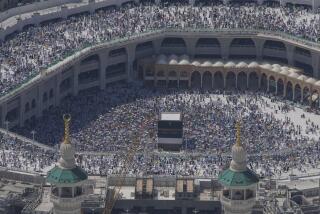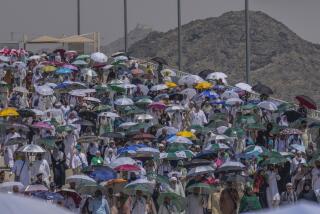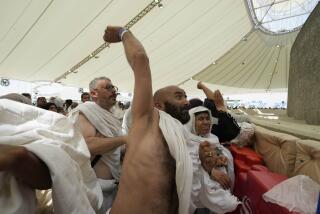Saudi Authorities Strive to Make Hajj Safer for Pilgrims
- Share via
CAIRO — Halid Abdel Wahab Halid stood outside the airport terminal, the white cloth draped over his bare shoulder and around his waist held precariously in place by steel rivets he had fashioned himself, and explained his decision to undertake the most solemn journey of his life.
“I am getting older. I felt this was the time,” said the 57-year-old civil engineer, his face beaming with anticipation as he prepared to board a chartered flight bound for Jidda, Saudi Arabia.
“You cannot express in words what this means to you. That is only in your heart,” he said before accepting a quick kiss from his grown daughter and trundling into the busy airport where the departure of the “hajjis” was marked by a colorful tent and large banner wishing “a blessed pilgrimage and forgiveness of your sins.”
During hajj season, flights leave Egypt for Saudi Arabia several times daily for two weeks.
Each year, more than 2 million people from among the world’s estimated 1 billion Muslims garb themselves in unsewn white garments (denoting equality) and make their way--by air, sea or land--to the remote Saudi city of Mecca, birthplace of Muhammad.
“You are dressed as though you are going to the tomb,” said Galal Abdel Aziz, 34, a Cairo tile layer. “It is something like the Judgment Day. You are going to ask God to forgive you for all your sins.”
The hajj is the fifth pillar of Islam--after faith, prayer, charity and fasting--and is obligatory for all Muslims once during their lifetimes if their health and finances permit.
It is the world’s most-attended religious event--which climaxes Monday--and for many the trip costs their life’s savings. But few pilgrims regret the price or come away unchanged.
Until this century, the hajj was typically made overland in vast camel caravans escorted by swordsmen, drummers and musicians. Food and water were the traveler’s main challenge, and many a pilgrim died of thirst before reaching his goal.
The caravan from Cairo took 36 days, from Damascus, Syria, 30. But pilgrims from more distant centers of Islam, for instance in West Africa or Indonesia, might devote years to the journey. In the modern era, the trip has lost much of its physical rigor. Some travelers arrive first-class and stay in five-star hotels.
So that the ceremonies will not be overwhelmed, the Saudis now seek to limit the number of pilgrims from each country to 1,000 per 1 million population.
In Egypt, 66,000 pilgrim visas were granted this year, and the price of a 15- to 20-day trip ranged from $2,100 to $5,300, depending on the accommodations. The law limits travel agencies’ profit on hajj business to 12%.
For the Saudis, hosting the hajj is a source of great prestige. But it also represents a considerable logistical challenge.
Over the years, the Saudi royal family has spent billions of dollars to expand the hajj facilities and renovate the various holy sites to avoid congestion.
The problems range from providing air conditioning at religious sites to freezing and distributing the meat of more than 400,000 sheep, camels and cattle that will be sacrificed after hajj rituals.
Reacting to a fire last year that killed 343 pilgrims, the government has fitted nearly 11,000 tents--now made of fire-resistant material--with 42,000 water sprinklers at a cost of $800 million, according to Saudi news accounts.
About 10,000 doctors and nurses will be on call round the clock during the pilgrimage, Saudi Health Minister Osama Shobokshi said. And a dozen helicopters will hover over Mecca to report on possible overcrowding or stampedes, according to news reports.
The hajj has witnessed other tragedies as well. In 1987, more than 400 Iranian pilgrims died in clashes with Saudi security police after the Iranians’ denunciation of infidels turned into an anti-American political rally.
This year, Iranian President Mohammad Khatami has urged pilgrims from his nation to show restraint and avoid “fanaticism.”
More to Read
Sign up for The Wild
We’ll help you find the best places to hike, bike and run, as well as the perfect silent spots for meditation and yoga.
You may occasionally receive promotional content from the Los Angeles Times.






